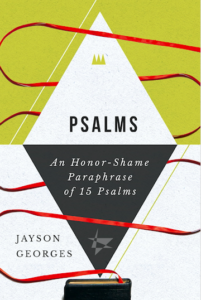Psalms: An Honor-Shame Paraphrase (New Book)
 Psalms: An Honor-Shame Paraphrase of 15 Psalms is now available to purchase. Along with 1 Peter and Esther, this is the third title in the Honor-Shame Paraphrase series.
Psalms: An Honor-Shame Paraphrase of 15 Psalms is now available to purchase. Along with 1 Peter and Esther, this is the third title in the Honor-Shame Paraphrase series.
Psalms: An Honor-Shame Paraphrase of 15 Psalms renders the insights and cultural nuances of biblical writers into accessible, contemporary language. This book includes an extended socio-theological introduction Psalms, a bibliography for further research, and then a paraphrase of Psalms 8, 12, 15, 23, 25, 30, 44, 74, 75, 89, 96, 109, 113, 129, and 146.
When people want to learn about honor and shame in the Bible, I often suggest they read the book of Psalms. The reason for this is simple—honor and shame are profound emotions that people feel, not academic categories or cerebral ideas. People in all cultures use the figurative language of songs and poetry to express the deepest passions of their heart. This is the reason Psalms—a collection of 150 ancient Hebrew songs and poems—offers a rich perspective on honor and shame. This honor-shame paraphrase of Psalms captures these deeply personal and social realities.
Learn more about the Honor-Shame Paraphrase or buy the book here. Click here to request a free PDF copy for classroom use or public review. The next post will feature the honor-shame paraphrase of Psalm 23.
Endorsements for the Honor-Shame Paraphrase
“The Honor-Shame Paraphrase series gives us a fresh look at an ancient perspective. As a paraphrase, each book nicely serves as a middle ground between a commentary and a translation. Accordingly, they aptly highlight diverse and subtle ways that honor and shame influence the biblical writers. One easily sees the care given to remain biblically faithful and culturally meaningful. I commend this series both as a useful tool for personal study and public ministry.”
—Dr. Jackson Wu, professor to Chinese pastors, author of Saving God’s Face
“Applying shame and honor as ever present realities in the ancient world, Jayson Georges powerfully accents the cultural values behind the words that would otherwise seem flavorless. His paraphrasing penetrates deeply into the intentions of the heart that often lay hidden from readers. We are exposed to life as it was lived, feelings as they were felt and hidden motives as they were brought to light. The biblical text breathes afresh with meaning.”
—Dr. Duane H. Elmer, Emeritus Distinguished Professor, Trinity Evangelical Divinity School, author of Cross-Cultural Servanthood
“In a rapidly globalizing world cultural differences are confronting us daily. Not only have these cultural differences exposed a cultural bias in our daily lives, but they have also exposed the significant role culture plays in our approach to the Bible. The Honor-Shame Paraphrase provides a great resource that helps people understand how the Bible would have been understood in the Ancient Near East. I am both thankful and excited to recommend a resource that will help us understand the Bible.”
—Spencer MacCuish, President, Eternity Bible College
“This lively and engaging paraphrase of Esther, like all the biblical paraphrases in this series, seeks to illuminate and express key implicit cultural assumptions shaping biblical discourse. Sumptuous food and fabulous feasting, role violations and status reversals, male honoring and female defiance, enemy plotting and counter-cultural female heroics are all displayed here as strands of a fascinating story of honor denied and honor bestowed.”
—Dr. John H. Elliott, Professor Emeritus, University of San Francisco, author of 1 Peter, Anchor Bible Commentary

Leave a Reply